
Methodological Paradigms in Environmental Education - Alexandre de Gusmão Pedrini
Methodological Paradigms in Environmental Education: A Comprehensive Guide
Introduction
In the face of pressing environmental challenges, environmental education has emerged as a critical tool for fostering sustainable practices and raising awareness about the importance of protecting our planet. "Methodological Paradigms in Environmental Education" by Alexandre de Gusmão Pedrini offers a comprehensive exploration of various methodological approaches that can be employed in environmental education programs. This book provides a wealth of insights and practical guidance for educators, policymakers, and anyone passionate about promoting environmental sustainability.
Key Features
Comprehensive Coverage: Pedrini presents a thorough examination of a wide range of methodological paradigms, including inquiry-based learning, problem-based learning, experiential learning, and transformative learning. Each paradigm is discussed in detail, highlighting its strengths, limitations, and potential applications in environmental education.
Real-World Examples: The book is enriched with numerous real-world examples and case studies that illustrate how different methodological paradigms have been successfully implemented in environmental education programs. These examples provide valuable insights into the practical aspects of environmental education and demonstrate the effectiveness of various approaches.
Theoretical Foundations: Pedrini delves into the theoretical underpinnings of each methodological paradigm, exploring the philosophical and pedagogical principles that inform their design and implementation. This theoretical grounding helps readers understand the rationale behind different approaches and make informed decisions about their use in environmental education.
Critical Analysis: The book offers a critical analysis of each methodological paradigm, identifying potential challenges and limitations. Pedrini encourages readers to critically evaluate the suitability of different approaches based on the specific context and objectives of their environmental education programs.
Practical Guidelines: Each chapter concludes with practical guidelines for implementing the discussed methodological paradigm in environmental education settings. These guidelines provide step-by-step instructions, tips, and resources to help educators effectively integrate these approaches into their teaching practices.
Why You Should Read This Book
"Methodological Paradigms in Environmental Education" is an essential resource for anyone involved in environmental education, including educators, policymakers, researchers, and practitioners. It offers a comprehensive understanding of different methodological approaches, empowering readers to design and implement effective environmental education programs that can make a real difference in promoting sustainability and environmental awareness.
Conclusion
In a world facing urgent environmental challenges, "Methodological Paradigms in Environmental Education" provides a valuable roadmap for educators and change-makers to navigate the complexities of environmental education. By exploring a diverse range of methodological paradigms and offering practical guidance, this book equips readers with the knowledge and tools to create impactful environmental education programs that inspire positive change and contribute to a more sustainable future.